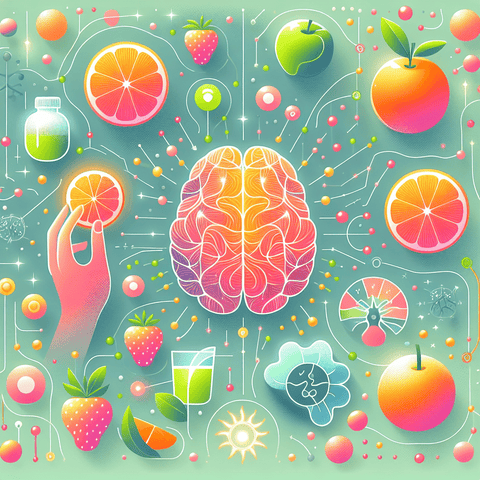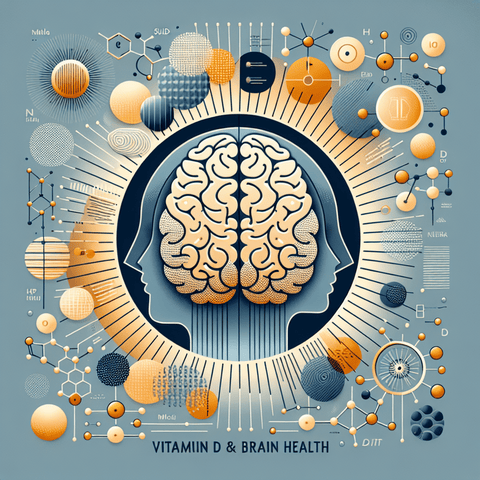Unlocking the Secrets: How Vitamin C Enhances Your Brain Health and Cognitive Function
Meta description: Discover how Vitamin C can boost your brain health and sharpen cognitive function. Learn simple ways to incorporate this powerful nutrient into your routine for a healthier, more focused mind.
Introduction
In a world where cognitive demands are constantly increasing—whether it’s juggling work deadlines, multitasking in everyday life, or striving for mental clarity—the importance of maintaining optimal brain health cannot be overstated. Researchers and health enthusiasts alike recognize that nutrition plays a pivotal role in supporting cognitive vitality over the lifespan. From omega-3 fatty acids to B-vitamins, many nutrients are celebrated for their contributions to brain function. However, among these, Vitamin C stands out as a multifaceted powerhouse with a less obvious but equally vital role in sustaining and enhancing mental performance.
While traditionally associated with immune support and antioxidant protection, recent scientific insights reveal that Vitamin C also plays a critical role within the brain—supporting neuroprotection, facilitating neurotransmitter synthesis, and combating oxidative stress. Its potential to promote mental clarity, bolster memory, and protect neural tissues against age-related decline renders it an essential supplement for anyone looking to maintain cognitive health through lifestyle choices.
This comprehensive guide aims to uncover the scientific mechanisms behind Vitamin C’s influence on brain function, explore practical ways to incorporate this vital nutrient into your daily routine, and highlight the importance of a holistic approach to cognitive wellness. Whether you’re seeking to optimize mental performance at work, safeguard against neurodegenerative diseases, or simply enjoy sharper focus and mental resilience, understanding the benefits of Vitamin C is an essential step toward achieving those goals.
Vitamin C and Nutritional Supplements: A Key to Brain Vitality
Vitamin C, known scientifically as ascorbic acid, is an essential water-soluble vitamin that humans cannot synthesize endogenously. As such, it must be acquired through diet or supplementation. Its primary reputation has revolved around immune support—protecting against pathogens, reducing inflammation, and speeding up recovery from illness. However, accumulating evidence underscores its importance in brain health, particularly in sustaining neural integrity and cognitive prowess.
Vitamin C functions as a potent antioxidant, protecting brain cells from oxidative stress—a process implicated in aging and neurodegeneration. It also plays a role in neural communication, neurotransmitter synthesis, and collagen formation in blood vessels within the brain. Despite the presence of Vitamin C in certain fruits and vegetables like oranges, strawberries, and bell peppers, many individuals do not meet the recommended daily intake through diet alone. This dietary gap emphasizes the importance of supplementation, especially for those at risk of deficiency or with increased cognitive demands.
Supplements come in various forms—tablets, capsules, powders, and even liposomal preparations designed to enhance bioavailability. Scientific studies suggest that maintaining adequate Vitamin C levels through supplementation can support cognitive functions that decline with age and reduce the risk of neurodegenerative conditions. For example, research indicates that higher plasma Vitamin C levels are associated with better performance on cognitive tests, highlighting the critical role of this nutrient in maintaining mental acuity as we age.
Therefore, supplementing with high-quality Vitamin C not only fills dietary gaps but also offers a practical strategy to support brain vitality. When combined with a balanced diet rich in antioxidants and omega-3 fatty acids, Vitamin C becomes a cornerstone of a comprehensive approach to healthy cognitive aging.
Neuroprotection: Fortifying Your Brain Against Damage and Degeneration
The brain's neural tissue is exceptionally vulnerable to oxidative damage due to its high oxygen consumption and abundance of lipid-rich membranes. Neurodegenerative diseases such as Alzheimer’s and Parkinson’s are characterized by progressive neural loss, driven in part by oxidative stress and inflammation. Therefore, protecting neural tissues from oxidative damage is a key strategy in preserving cognitive health over time.
Vitamin C acts as a robust neuroprotective agent by scavenging reactive oxygen species (ROS)—unstable molecules that cause cellular damage. This antioxidant activity helps neutralize free radicals before they can harm neurons. The brain’s high lipid content makes it particularly susceptible to lipid peroxidation, which damages cell membranes and impairs neural signaling. By preventing this process, Vitamin C preserves the structural integrity of neural cells.
Furthermore, Vitamin C modulates neuroinflammation—a significant contributor to cognitive decline and age-related neurodegeneration. Chronic neuroinflammation accelerates neuronal loss and impairs synaptic function. Studies have shown that adequate Vitamin C levels are associated with decreased markers of neuroinflammation, suggesting a protective effect that could slow disease progression.
Various epidemiological studies indicate that populations with higher Vitamin C intakes have reduced instances of cognitive decline and neurodegenerative diseases. Experimental models further demonstrate that supplementation can mitigate oxidative damage and neuroinflammation, reinforcing the concept that Vitamin C proactively supports brain health. Practical measures include increasing dietary intake and considering supplementation, especially in populations at higher risk of deficiency or neurodegeneration.
To maximize neuroprotection, individuals should consider incorporating high-dose Vitamin C supplements, particularly during age-related cognitive stress or in the context of other antioxidant support. Combining Vitamin C with other protective nutrients—such as Vitamin E, polyphenols, and omega-3 fatty acids—might offer synergistic benefits for brain health preservation over time.
Cognitive Enhancement: Boosting Your Mental Performance and Memory
Beyond neuroprotection, Vitamin C actively participates in the enhancement of cognitive functions, including learning, memory, and processing speed. This role is rooted in its involvement in neural plasticity—the brain’s ability to adapt and reorganize itself—which is fundamental for acquiring and consolidating new information.
Research indicates that adequate Vitamin C levels support the synthesis and release of neurotransmitters—chemical messengers that facilitate communication between neurons. Notably, Vitamin C is a cofactor in the biosynthesis of norepinephrine, serotonin, and dopamine—all integral to mood regulation, motivation, and cognitive function. Deficiencies in Vitamin C can impair these processes, potentially leading to mental fog, decreased alertness, and slower reaction times.
Furthermore, Vitamin C supports the integrity of neural circuitry by promoting healthy synaptic connections. It influences neural stem cell proliferation and differentiation, which are essential for maintaining neuroplasticity—the foundation for learning and memory. Studies have shown that individuals with higher plasma Vitamin C concentrations perform better on tests measuring memory, attention, and problem-solving skills.
To incorporate Vitamin C into a cognitive-boosting routine, consider supplementing with formulations that optimize bioavailability. For example, liposomal Vitamin C preparations can deliver higher concentrations directly to brain tissues. Combining this with other nootropic nutrients—such as DHA, B-vitamins, and magnesium—can further amplify cognitive benefits.
Daily routines might include taking Vitamin C supplements shortly before mentally demanding tasks or integrating foods rich in Vitamin C, such as berries and citrus, into meals. Consistency is key, as maintaining stable blood levels of this nutrient supports ongoing cognitive performance and resilience against mental fatigue.
Antioxidant Properties: Combating Oxidative Stress to Preserve Brain Health
Oxidative stress, caused by an imbalance between free radicals and antioxidants, is a major contributor to aging-related cognitive decline and neurodegeneration. Neurons are particularly susceptible to oxidative damage due to their high metabolic rate and lipid-rich environments. Left unchecked, this stress accelerates the aging process within the brain, impairing synaptic function, disrupting neural communication, and damaging DNA and cellular components.
Vitamin C’s role as a central antioxidant within the central nervous system is well-documented. It readily crosses the blood-brain barrier, accumulating in neural tissues where it actively neutralizes ROS. This action not only protects existing neural structures but also supports cellular repair processes.
Antioxidants like Vitamin C slow the accumulation of oxidative damage, which correlates with delayed onset of cognitive decline. Studies suggest that higher antioxidant capacity within the brain is associated with preserved cognitive functions in elderly populations. When combined with other antioxidants, such as Vitamin E and polyphenols, Vitamin C’s protective effects are amplified due to synergistic interactions that regenerate each other’s active forms for sustained activity.
Optimal dosing strategies recommend consistent intake of at least 200 mg daily—although higher therapeutic doses can be considered under professional guidance—especially during periods of increased oxidative stress, such as during illness or environmental exposure. Incorporating antioxidant-rich diets alongside supplementation can further bolster the brain’s defenses against oxidative damage.
Mental Clarity: Promoting Focus, Mood, and Overall Brain Function
Maintaining mental clarity is vital for productivity, emotional regulation, and overall well-being. Factors such as fatigue, stress, and poor nutrition can cloud thinking and diminish focus. Vitamin C’s influence on mental clarity extends beyond its cellular protective effects; it actively modulates neurotransmitter systems and reduces mental fatigue.
Several studies have demonstrated that Vitamin C supplementation alleviates mental fog and improves alertness. It also reduces feelings of stress by attenuating cortisol levels and supporting neurochemical balance. Adequate Vitamin C intake has been linked to improved mood, possibly by enhancing serotonin synthesis—a neurotransmitter heavily involved in happiness and emotional stability.
During demanding mental tasks, supplementation with Vitamin C can help sustain energy levels and prevent cognitive overload. Practical approaches include consuming Vitamin C-rich foods or supplements during periods of high mental effort or fatigue. Combining Vitamin C with other adaptogenic herbs and nutrients can create a comprehensive strategy for maintaining mental clarity and emotional resilience.
Neurotransmitter Support: Facilitating Communication Between Brain Cells
The synthesis and release of neurotransmitters are fundamental to brain communication, influencing everything from mood to motor control. Vitamin C acts as a key cofactor in the production of critical neurochemicals like norepinephrine, serotonin, and dopamine. It also helps regulate receptor sensitivity and neurotransmitter reuptake, fine-tuning neural communication channels.
By supporting neurochemical balance, Vitamin C plays an indirect yet significant role in emotional health, stress resilience, and motivation. For instance, deficiencies can lead to mood disturbances and impaired cognitive flexibility. Scientific evidence suggests that adequate Vitamin C levels optimize receptor function and neurotransmitter availability, promoting a stable and responsive neural environment.
For best results, ensuring sufficient Vitamin C intake through diet or supplementation is recommended, especially during periods of emotional stress or cognitive overload. Combining Vitamin C with other brain-supporting nutrients like omega-3 fatty acids enhances neurochemical interactions, leading to improved mental stamina and emotional stability.
Conclusion
Vitamin C is far more than a simple immune booster—its profound influence on brain health and cognitive function is backed by a growing body of scientific research. From neuroprotection and antioxidant defense to enhancing neural communication and mental clarity, Vitamin C supports every aspect of cognitive vitality. Incorporating adequate amounts through diet and supplementation can be a simple yet powerful step toward maintaining a sharp, resilient, and healthy brain throughout life.
Personalized supplementation plans, combined with a nutritious lifestyle, form the cornerstone of long-term cognitive wellness. Remember to consult healthcare professionals to determine the right dosage and form for your needs. With the right approach, you can unlock the full potential of this incredible nutrient and give your brain the support it deserves.
Q&A: Your Key Questions About Vitamin C and Brain Health
Q1: How much Vitamin C should I take daily for optimal brain health?
While the recommended daily intake for general health is around 75-90 mg for adults, research suggests that doses of 200 mg or higher can provide enhanced neuroprotective and cognitive benefits. Consult with a healthcare provider to tailor the dosage to your personal needs.
Q2: Can Vitamin C prevent neurodegenerative diseases?
While definitive prevention is not established, studies indicate that adequate Vitamin C intake may reduce oxidative stress and neuroinflammation—factors linked to neurodegeneration—potentially lowering risk and supporting brain longevity.
Q3: Is it better to get Vitamin C from food or supplements?
Both sources have benefits. Fruits and vegetables provide additional nutrients and phytochemicals, but supplementation ensures consistent and sufficient intake—particularly if dietary intake is inadequate. Consider combining both approaches for optimal results.
Q4: Are there any side effects of high-dose Vitamin C?
High doses are generally safe but can cause gastrointestinal discomfort or kidney stones in predisposed individuals. Always adhere to recommended dosages and consult your healthcare professional before high-dose supplementation.
Q5: How quickly can I expect to see cognitive benefits from Vitamin C supplementation?
Response times vary; some individuals notice improvements in mental clarity and focus within a few weeks, while others may require several months for noticeable effects. Consistency and holistic health practices enhance outcomes.
Important Keywords
- Vitamin C brain health
- Cognitive function
- Neuroprotection
- Antioxidant effects
- Neurotransmitter synthesis
- Mental clarity
- Memory support
- Oxidative stress
- Neurodegenerative diseases prevention
- Supplementation strategies



